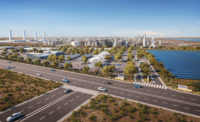Energy developer Nacero Inc. has tapped global engineering and construction contractor Bechtel to design a $6.5 billion to $7 billion plant the firm plans to build in the Permian Basin — a facility Nacero says would be the nation’s first natural-gas-to-gasoline manufacturing facility.
Nacero on May 25 awarded a front-end engineering and design (FEED) contract to Bechtel for the 115,000-barrel-per-day facility, which project officials say will incorporate carbon capture, sequestration and 100% renewable power.
The Odessa Development Corp. and Houston-based Nacero on April 22 announced plans to build the plant in Penwell, Texas, just outside of Odessa.
“This project is truly a game changer,” said Bechtel Energy president Paul Marsden in a release.
"Decarbonization is a key to our energy transition here in the U.S. and around the world,” Bechtel Energy president Paul Marsden said in a statement to ENR. "Nacero and their pioneering approach to lower-carbon gasoline are a great fit for these ambitions. Efforts like this also empower everyday people to contribute to the energy transition towards net zero. It is really powerful.”
Once Bechtel completes the FEED contract, it will deliver a lump-sum price proposal for engineering, procurement and construction. Project officials say Bechtel will employ sustainable design practices and work toward reducing the project’s carbon footprint, both in the supply chain and during construction.
“For America to achieve its domestic energy and climate change mitigation goals, we need big vision and laser-focused execution. Bechtel is center stage in helping us get there,” Nacero president and CEO Jay McKenna said in a release.
At its peak, construction of the four-year first phase is expected to employ 3,500 skilled construction workers on site and would produce 70,000 barrels-per-day of gasoline component, ready for blending. The second phase is expected to take two more years and will increase capacity to 100,000 barrels per day.
When fully operational, the plant will employ 350 full-time operators and maintenance personnel.
Made from a combination of natural gas, captured bio-methane and mitigated flare gas, the gasoline produced at the facility will not contain sulfur and will have half the lifecycle carbon footprint of traditional gasoline, according to the company.
Most of plant’s electricity will come from energy produced by solar panels on the 2,600-acre site.




Post a comment to this article
Report Abusive Comment